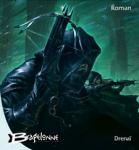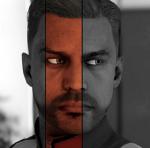http://www.steveneri...f-karsa-orlong/
Quote
To say that, among all the characters portrayed in The Malazan Book of the Fallen, Karsa Orlong has proved the most divisive among readers of the series is probably beyond refute. Discussions arise regarding this character again and again, and as the debate returns in this TOR re-read, the question of my purpose in creating this character could probably be addressed: so I will.
Consider this an essay, then. The problem posed by Karsa and how readers perceive him will, for me, find its answers from a range of angles; from the Fantasy genre itself, to anthropology, history, cultural identity and its features, to the structure of the series (and the novel in question) and, eventually, to the expectations that fantasy readers bring to a fantasy novel. You may note something of an ellipse in that list, but that’s how I think so bear with me.
Historically within the genre the role of the ‘barbarians’ has roughly split into two morally laden strains. On the one hand they are the ‘dark horde’ threatening civilization; while on the other they are the savage made noble by the absence of civilization. In the matter of Karsa Orlong, we can for the moment disregard the former and concentrate instead on the noble savage trope—such barbarians are purer of spirit, unsullied and uncorrupt; while their justice may be rough, it is still just. One could call it the ‘play-ground wish-fulfillment’ motif, where prowess is bound to fairness and punishment is always righteous. The obvious, almost definitive example of this is R.E.Howard’s Conan, but we can take a more fundamental approach and consider this ‘barbarian’ trope as representing the ‘other,’ but a cleaned-up version intended to invite sympathy. In this invitation there must be a subtle compact between creator and reader, and to list its details can be rather enlightening, so here goes.
We are not the ‘other,’ and this barbarian’s world is therefore exotic, even as it harkens back to a pre-civilized, Edenic proximity. The barbarian’s world is a harsh one, a true struggle for existence, but this struggle is what hones proper virtues (‘proper’ in the sense of readily agreeable virtues, such as loyalty, courage, integrity, and the value of honest labour). Against this we need an opposing force; in this case ‘civilization,’ characterized by deceit, decadence, conspiracy, and consort with evil forces including tyranny: civilization represents, therefore, the loss of freedom (with slavery the most direct manifestation of that, brutally represented in chains and other forms of imprisonment). In essence, then, we as readers are invited to the side of the ‘other,’ the one standing in opposition to civilization. Yet… we readers are ‘civilized.’ We are, in fact, the decadent products of a culture that has not only accepted the loss of freedom, but in fact codifies that loss to ease our discomfort (taxes, wage-slavery, etc). In this manner, we are offered the ‘escapist’ gift of Fantasy; but implicit in this is the notion that a) we need to escape; and
[So, is it not ironic that Leo Grin (a great fan of R.E. Howard) attacks modern fantasy as nihilistic? This man's incomprehension of Howard's own nihilism and anarchic rejection of civilization is, simply, jaw-dropping. Amusing digression ends.]
This brings me (and I can almost hear the groans) to anthropology, although one could approach the notion of the ‘other’ from a whole host of theoretical stances, including mytho-Jungian, sociological, psychological, etc. The point is, the ‘other’ is universal to the human condition: it exists in every culture. I won’t go into too much detail here, since the singular point I want to make is that the notion of the ‘other’ is implicitly arrogant. Most cultures give themselves a collective identity (the ‘us’) and often attribute to themselves a name that means something like ‘the people,’ implying that the ‘others’ are not quite people. This has of course justified all manner of conflict and subjugation, from ancient times to the present. Accordingly, it is not unique to ‘civilization’ per se but to all cultures, regardless of their technological level and social organization. To be the (one and only) ‘people’ is an arrogant assertion: defined in terms of specific habits, behaviours, physical features, language, religion, and so on, but ultimately profoundly conceited in its essential world-view. By this means all manner of atrocity is possible when dealing with the ‘other’ (and all militaries impose psychological ritual to ensure that the soldier sees the enemy as an ‘other’ and therefore less than human and therefore permissible to kill).
[It's not all grim: the notion of 'us' has essential virtues in collective identity, through the sharing of values, community cohesion, and so on; but it's probably fair to say that the pay-off is not quite a balanced one, given that the inherent weakness of 'us' hints at fundamental flaws in that kind of thinking, even if the notion of 'us' also happens to be necessary for a society to function]
Barbarian societies can be as arrogant as civilized ones: the only difference is in the expression of that arrogance. At its core it’s all one, and seems to be a characteristic of the human condition (to this day, for all of our efforts at self-identifying ourselves as a global culture, we continue to impose borders, define select privileges, exercise extortion of weaker peoples, and in the rejection of one community (the neighbourhood) we raise countless others, defined by political afiliation, religion, skin colour or whatever).
There are other implicit judgements to the ‘other.’ Among the Romans the ‘barbaric’ other was not viewed as less-than-human, but in terms of inherent weakness (of their culture). This justified subjugating them, occupying their lands, and enslaving as many of them as was economically possible. The notion of being ‘Roman’ was considered the height of civilized and cultural identity (though it came back to bite their Roman asses). [incidentally, and at the risk of offense, this is what made the teachings of Jesus so revolutionary, as they directly challenged the accepted definitions of self-identity and the institutions of authority in place to maintain them, only to be later co-opted and segmented into rival sects—more us's and more them's—in direct defiance of those very teachings. But one can also argue about the 'us' of believers and the 'them' of non-believers... I sense a vortex ahead so will end digression there]. This Roman stance was the notion of might-as-right and is of course yet another expression of arrogance. Later on, with the (re)-institution of slavery, drawing from Africa, the notion of less-than-human became the dominant ‘justification’ for brutalizing the ‘other.’ One can then turn to the treatment of Jews in Europe, and so on. The point is: history is the study of ‘us’ and ‘them’ and little else.
So, how does all this relate to Karsa Orlong? Well, as has been noted, there was something of the need to prove that I could sustain a single narrative going on (or so I recall, the sense of being pissed off about something is always short-lived and usually ephemeral, although the answer to it can prove far-reaching, as is certainly the case with Karsa); but obviously more was going on. I wanted to address the fantasy trope of the ‘barbarian’ (from the north, no less, and isn’t it curious how so many heroic barbarians come down from the north?), but do so in recognition of demonstrable truths about warrior-based societies, as expressed in that intractable sense of superiority and its arrogant expression; and in recognizing the implicit ‘invitation’ to the reader (into a civilization-rejecting, civilization-hating barbarian ‘hero’), I wanted to, via a very close and therefore truncated point of view, make it damned uncomfortable in its ‘reality,’ and thereby comment on what I saw (and see) as a fundamentally nihilistic fantasy trope: the pure and noble barbarian. Because, whether recognized or not, that fantasy barbarian hero constitutes a rather backhanded attack on the very civilization that produces people with the leisure time to read (and read escapist literature at that).
Within the scope of Karsa’s culture, he holds to his code of integrity and honour, even if they are initially friable in their assumptions (but then, so are all of our assumptions about ‘us’ and about the ‘other’). We observe the details of that culture, revealed bit by bit—with plenty of hints as to its flawed beliefs—and with each detail, we as readers are pushed further away from our own civilized sensibilities.
In one sense, consider Karsa’s tale at the opening of House of Chains as a walk back through time, to the world of, say, Beowulf. As much as we find Beowulf entertaining as a poem, and can even admire it, its ‘barbaric’ sensibilities are profoundly alien to us. Here we have a hero (Beowulf) who shows up as a stranger, only to spend an evening bragging about his superiority over all others, before ultimately usurping Hrothgar’s kingdom… if I may humbly ask this: if you saw Karsa Orlong sitting at Hrothgar’s table that night would you feel him out of place?
The question is: how far from our own sensibilities can we be pushed before it’s too much? Is it his brazen arrogance? Is it the culturally-acceptable rapes? Is it the slaughter of townsfolk, the rejection of Karsa’s companions due to their failures—their weaknesses? Is it his unquenchable self-belief? His need for vengeance? His excessive vows pronounced seemingly without thought? His rejection of civilization? His rejection of enslavement? In other words, where in that Conanesque code of conduct do we reel back a step, shaking our heads?
One of the areas of serious disturbance among readers is, quite understandably, the rape scenes. There is a counterpoint to these, found later in the novel, that includes Karsa’s very direct answer to it, which while on the surface may seem contradictory to his nature, is in fact anything but. Another area is the use of the word ‘children’ when voicing his exploits of slaughter (but then, if child-slaying is a universal taboo, what does that say about our culture, with its missing children; and what does it say about our foreign policies and/or our fanatic religious beliefs, that see children killed every day; or our notions of wealth, that see entire countries left to starve?).
Having established this tight, myopic point of view of the ‘classic’ barbarian (reasonable for an isolated people of remote mountain regions)—and structuring the tale empty of overt authorial judgement yet relentless in its detail, one might then expect to see me take the ‘dark horde’ route and offer up civilization as the beacon of virtue and enlightenment. But then… maybe Howard had a point? For all that his nihilistic rejection of civilization, personified in the Hyborian Tales of Conan, is an invitation to despair (like a bullet to the head), it cannot be dismissed out of hand. Civilization has its problems, and even more distressing, there was indeed a kind of freedom in the pre-industrial age that we can only dream of (but how rose-tinted are those dreams, discounting as they do death-in-childbirth, intestinal parasites, disease, disfigurement, starvation, slavery and so on? Just how far into the ‘escapism’ from reality should the Fantasy genre offer up? Oh, and that is the sixty-four dollar question I’m slowly approaching: the expectations of the fantasy readership, but everything in its time…). Accordingly, Karsa’s introduction into civilization is one made in chains—in the stripping away of his ‘barbaric’ freedom. But arrogance is an unruly beast and he will not so easily be tamed, and so the struggle between barbarism and civilization becomes his own personal struggle (even Conan grumbled as much).
This then is a journey of prejudices under assault.
No wonder it makes so many people uncomfortable. We may not share Karsa’s prejudices, but we share prejudices. Because this is a fantasy novel and so incorporates adventure, this assault is personified with violence, and there is no need (for Karsa, anyway) to internalize it (Karsa is an outward character, not an inward character—and what you see is what you get and what you get is everything that he is, but that does not make him simple. In fact, he is probably the most complex character in the entire series, and in my recognition of that I saw that his tale could bear the weight of its own trilogy, and so it will).
We come at last to the expectation of the fantasy readership, and if you thought I walked a fine line with Karsa, wait till you read what follows. I am not just a writer of fantasy; I am a reader of fantasy, and so I can comfortably stand on both sides of this issue (as can all fantasy writers, barring those who claim to have never read fantasy, and those ones are either dissembling or they truly don’t have a clue). I have already broached the subject of escapism, but that is a universal notion made up of numerous and at times contradictory desires, depending on who you talk to. So it needs elaborating.
One of the traditional appeals to epic fantasy literature of the ‘dark horde’ variety was its simplification of morality. There was clearly defined good and clearly defined evil. Good was good and evil was reprehensible. We were invited into a world where we knew who the good guys were, we knew who the bad guys were, and we knew that by the end the good guys would win, standing triumphant on the corpses of the bad guys (restless corpses were better, since that invited sequels). This is the child-like, play-ground appeal, and in appealing to the child in us it comforts by virtue of its simplicity; while at the same time its codifies the ‘good’ virtues and the ‘bad’ vices, which could in one sense serve as life-lessons. Accordingly, this kind of fantasy’s engagement with reality was one of reduction, infused with exotic ‘otherness’ to stir the wonder of an imaginative mind. Comforting stuff, affirming stuff—in fact, the very stuff that Leo Grin applauds.
But that’s ‘epic’ fantasy. It’s not sword and sorcery fantasy: it’s not R.E. Howard (arguably, it’s not JRR either, but I’ll skirt that particular can of worms here). Howard’s barbarian hero promised chaos and destruction—well, he promised to maintain his barbaric virtues even if it took the world down around him (lovingly spoofed in Jakes’ ‘Mention My Name in Atlantis’). And it if did, well, that was a civilized world, wasn’t it, so good riddance. The sword and sorcery form of fantasy literature twisted things, but something of that simplistic, reductionist sensibility still remained. Good was good (if a little hard) and evil was evil. Only the stigmata had changed. The ‘good’ was the purity of the Cimmerian ice fields; the evil was the steamy civilized southlands with their serpent gods and all the rest. It’s escapism of the nihilistic vengeance sort, the fascistic scouring away of corrupting forces (that part Leo liked, so doubt), with the Northern (white-skinned) Man standing triumphant, a freed and happily large-breasted ex-slave wrapped lovingly round one leg, on her knees of course).
Escapism is seductive, and what it might reveal about us is not always pleasant on reflection: it comes down to the flavours we prefer, the paths we find most inviting to our more fundamental belief systems—whether self-articulated or not, and that alone is enough to make any thinking person shiver.
Karsa is all of that stripped bare; and in turn he infuriates, shocks, and on occasion makes the jaw drop in disbelief. But he is also the reality of the ‘barbaric’ and so represents an overt rejection of the romanticized, fantasized barbarian trope. Some people don’t like that. Fair enough.
I come at last to my consideration of audience expectations. Believe me, I did consider them. I always consider them—but consideration does not guarantee a change of mind regarding the course I choose: more often, that consideration demands from me a challenge in exercising subtlety, and this is the nature of subversion as I work it into my novels (and series). Karsa subverts the ‘fantasy’ of the barbarian hero in Fantasy, and he does so because I feel that there is something dangerous in that romanticism, and in that vengeful refutation of civilization. In turn, however, Karsa’s tale also subverts the notion of civilization as virtuous savior and deliverer of enlightenment, because history tells us otherwise
So I ended up punching both ways. It’s a damned wonder I didn’t lose everyone after ‘House of Chains’ (or, more accurately, during the reading of ‘House of Chains.’). Structurally, I could not have introduced Karsa any earlier than I did. After three novels (all subversive in their own, unique ways) I was ready for something more overt—I was ready to take on the barbarian fantasy. At the same time, an entire novel of that relentless point of view would have been one bridge too far. The struggle between barbarism and civilization is not just specific to Karsa or even his tale: it is the struggle within each of us, as we battle desires with propriety, and as we battle need with responsibility. In the remainder of the series, those battles are played out on grander scales. It could be argued that civilization’s greatest gift is compassion—the extension of empathy, even unto strangers, and as such acts in half-formed opposition to barbarism with its pragmatic viciousness, and if compassion must be our shield, it is against our own baser natures.
Karsa’s journey in this novel and in this series stand as stepping stones across this raging river of (invented) history. Later, he appears as a chorus in the ancient Greek sense, to remind us that we’re all playing with bones, not sticks and stones. To skip him is to miss a fundamental argument of this series: but then, as mentioned before, there are many forms of escapism, and the Fantasy genre speaks to them all at one time or another.
The Malazan Book does not offer readers the escapism into any romantic notions of barbarism, or into a world of pure, white knight Good, and pure, black tyrant Evil. In fact, probably the boldest claim to escapist fantasy my series makes, is in offering up a world where we all have power, no matter our station, no matter our flaws and weaknesses—we all have power.
I don’t know about you, but I’ll escape into that world every chance I can.
Now, as Karsa would say: “Too many words. Witness.”
Cheers
Steven Erikson
Quote
This post has been edited by waylander001: 03 August 2011 - 06:21 PM

 Help
Help



















